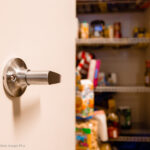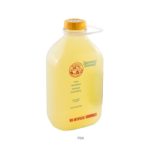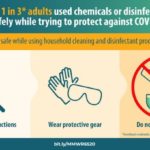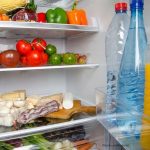As we head into the summer months in the Northern hemisphere, people start eating more fresh fruits and vegetables. And unfortunately, every year there are outbreaks linked to those products, from cyclospora to E. coli. As a matter of fact, fresh produce is one of the main ways people get sick from food poisoning, and one of the major causes of multistate food poisoning outbreaks. From Salmonella on peaches to E. coli on romaine lettuce to cyclospora on basil, these foods sicken thousands of people every year. While it's not possible to make these foods completely safe without cooking them to 165°F, you can reduce your risk by cleaning them properly before preparation. First, do not use soap or bleach or other disinfectants to clean fruits and vegetables. Because these items are … [Read more...]
Checklist for Cleaning Your Pantry and Refrigerator From USDA
It's time for spring cleaning in the northern hemisphere, and one place food safety conscious consumers should focus is the kitchen. Your pantry and refrigerator can harbor pathogens and should be regularly cleaned and sanitized. The USDA is offering a checklist for cleaning your pantry and refrigerator. Your refrigerator should always be set between 34°F and 40°F. Any higher and pathogens should grow, and any lower and food could freeze and lose quality. Many newer refrigerators do have built-in thermostats so you can check the temp, but if your doesn't, an inexpensive thermometer is available most everywhere. To keep your fridge clean, follow these steps. Always clean spills immediately with warm, soapy water. Don't use solvent cleaning agents or abrasives, since the fumes from … [Read more...]
Homestead Creamery Voluntarily Recalls Glass Bottled Products
Homestead Creamery voluntarily recalls glass bottled products because they may have residual chlorine from the sanitizing process. The bottles may have a strong sanitizer odor that may affect the taste of the product. There is no known health risk associated with this issue at this time. There are no serious illnesses reported to the company to date in connection with this problem. The company is located in Wirtz, Virginia. You can see the long list of recalled products at the FDA web site, along with the UPC number of each and the best if used by dates. Homestead Creamery voluntary recalls these products, which include Creamline Whole Milk half gallon, Homogenized Whole Milk half gallon, 2% Milk quart, Non-Fat Creamline Milk quart, Chocolate Milk half gallon, Cowpuccino Milk Quart, … [Read more...]
Americans Using Bleach and Disinfectants Improperly, According to CDC
According to a study published in the CDC's Weekly Morbidity and Mortality Weekly Report for June 5, 2020, many Americans are using bleach and disinfectants improperly during the coronavirus pandemic. Calls to poison centers regarding exposure to cleaners and disinfectants have increased during the pandemic. An internet panel survey found gaps in knowledge about the safe preparation, use, and storage of cleaners, bleaches, and disinfectants. One of the most striking items in the survey is that about 19% of American adults have used bleach to clean food. Overall, 39% of U.S. adults engaged in at least one high risk practice including washing food with bleach: they also said they applied household cleaning or disinfectant products to bare skin, or intentionally inhaled or ingested … [Read more...]
What Should You Do With a Recalled Food Product?
Food recalls are handled by the FDA and USDA. They tell consumers about problems or issues with the food they regulate. Recalls can range from a processing error or mislabeling to undeclared allergens and pathogen contamination. It's important that everyone be aware of these recalls and stay up to date. But what should you do with a recalled food product? It depends on the reason for the recall. If the recalled food product is recalled for something that isn't going to affect health, it's your choice whether or not to discard it. If the recall is for an undeclared allergen, it doesn't affect you or your family unless a person in your family is allergic to that ingredient; throw it away if this is the case. But if the recall is for a pathogen, you should follow these steps. Any … [Read more...]
Bacteria in Kitchen Towels: Or Why I Use Paper Towels
I am, obviously, extremely conscious of food safety in the kitchen. I have had food poisoning twice in my life: once as a child after eating hard boiled eggs that were left at room temperature, and as an adult after eating candied pineapple. Those terrible experiences, and my education, have prompted me to help others avoid this horrible illness. I try to tell you about prompt refrigeration, cleaning methods, safe cooking and handling methods, and other factors that can affect your risk of getting food poisoning. This topic is not well covered: the safety of kitchen towels. A new study published in Food Protection Trends documents the presence of bacteria in kitchen sponges and dishcloths. Researchers looked at kitchen hand towels and tested them to see if they contain pathogenic … [Read more...]
Cleaning Your Grill Today? Watch Out for Wire Bristles
The Centers for Disease Control and Prevention (CDC) has just released a Morbidity and Mortality report about ingestion of wire bristles from grill-cleaning brushes. (And here I just gave one to my brother-in-law for Christmas.) A series of six cases from a single hospital system in Providence, Rhode Island is the focus of this report. A previous report details six cases that occurred from July 2009 to November 2010. This report focuses on six cases that occurred during March 2011 to June 2012. The six patients range in age from 31 to 64 years. Five of the six were men. All of them had eaten food grilled outdoors, on grills that had been cleaned with commercially available wire grill-cleaning brushes. Injuries included puncture of soft tissues of the heck to perforation of the GI … [Read more...]












